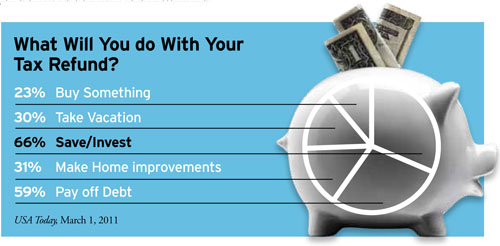Tuesday, July 12, 2011
WANNA BE FREE???? DEBT FREE.
Super Saver Tip #1 Reduce big-ticket items. Since the majority of us spend the most on housing (26% of income) and transportation (14%),[1] it makes sense to focus on trimming these areas first. Many super savers buy more modest homes than they can actually afford. For example, if you buy a $200,000 house rather than a $300,000, you’ll save $6,444 a year (not counting property taxes and insurance).[2] While downsizing to a smaller home saves you the most over time, selling these days may be tough. For a simpler way to save, focus on your next biggest expense: your car. Driving it after the loan is paid off can save you about $1,670 a year (based on skipping new-car payment and typical ownership costs for a five-year-old car).[3] Could your household get by with one car? Even better.
Super Saver Tip #2 Save, or invest any windfalls – including tax refunds.This year, about 66% are planning to save or invest their refund.[4] Make sure you are among them: If you turned last year’s average refund of $3,003[5] into a $250 monthly investment compounded monthly for 35 years, you could have $357,958 if you earned 6%, or up to $1.6 million if you earned a 12% rate of return (see chart). That’s a sum that could significantly improve your retirement – long after a new chair or other item you could have bought has been given away.
Super Saver Tip #3 Don’t buy anything until you can pay cash. Period. Not only do you avoid the burden of more credit card debt and costly interest, but you’ll spend less—approximately 10-35% less than those who pay with debit or credit card.[6] That’s instant cash you can stash into savings.
Super Saver Tip #4 Set Manageable Goals. Don’t overwhelm yourself with a list of 10 things to accomplish all at once. Set your priorities. For example, start building up an emergency fund by putting $50 a month into savings. Or pay more than the minimum on your lowest balance credit card. Or, start contributing monthly to an Individual Retirement Account.
Super Saver Tip #5 Make Saving Automatic. All the smart spending in the world won’t help unless you invest your savings. Most super savers know this, so they let computers do the work and automate their savings. For example, set 5% of your paycheck to go automatically into a retirement plan. Ask your Primerica representative about how you can get started saving in an Individual Retirement Account for as little as $50 a month.
Super Saver Tip #6 Take on Extra Work – and Stash the Cash. You’ve set your savings goals, trimmed your expenses and are still coming up short. What’s a wannabe super saver to do? Take matters into your own hands and get aggressive about reaching your goals. Is there a way to turn your talents and interests into part-time cash? Consider tutoring, childcare or taking on a part-time job. If you’re interested in learning more about financial goal-setting and helping families with their finances, talk to your Primerica representative about the part-time opportunity. It’s a great way to educate yourself and take your savings to the next level!
written by: Amy Wilson
questions? contact www.primerica.com/arklundt
